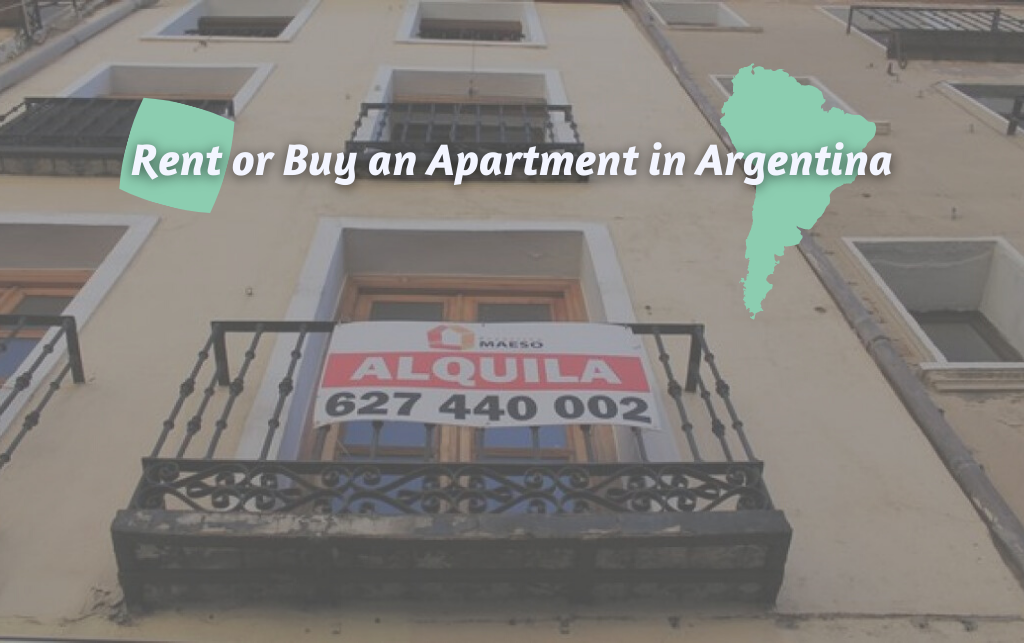Written by Carla Chinski, Content Marketing Manager at Vamos Academy
Making the Big Move: Renting Long-Term in Argentina
Staying in Buenos Aires for the long haul and renting an apartment, condo or PH as a foreigner can be especially harrowing as an expat, not to mention emotionally draining. It’s common to feel alone (or lonely) if no one’s there to guide you through the process. There are things to watch out for to avoid scams, and things that are crucial if you’re looking for an apartment in Buenos Aires, Argentina.
You should know there are two types of rentals: dueño directo (when the owner is solely responsible for selling or renting the property himself or herself, without any intermediaries) and via brokers (which, of course, can cost you a pretty penny in commissions).
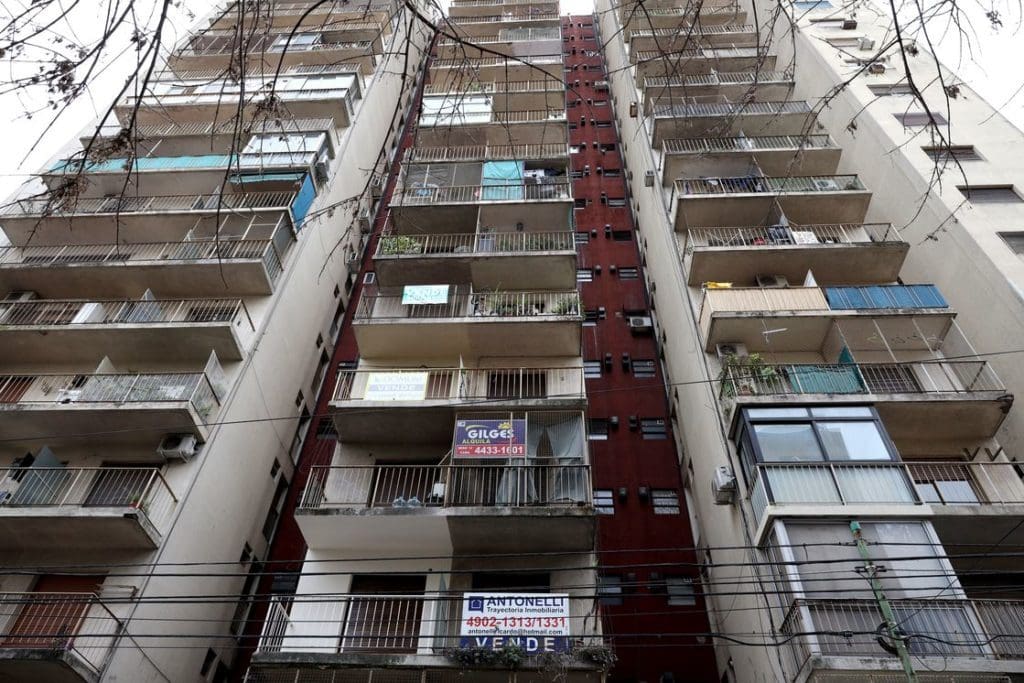

But what exactly counts as long-term? What is known as long-term in Argentina can vary from a three-to-six month rental period, and beyond. Generally speaking, most people rent for a year and then make the choice to renew the contract–or not. You should make an informed decision based on your life plans and goals. Within the category of “long-term” there is a shorter type of contract which is only good for three months, though if push comes to shove you can renovate it for another three. Renting an apartment for this amount of time is known as alquiler temporario. It is definitely a term you should keep in mind when searching.
Learn Spanish in Buenos Aires!
Requirements For Renting in Argentina: What You Should Know
It’s important to note, furthermore, that there are many requirements in place to rent an apartment, some of which are nearly impossible to access for younger people looking for apartments, especially in the city of Buenos Aires. It’s almost mandatory to have a stable job under the best conditions–called informally en blanco, as opposed to en negro (cash-only, a sort of unofficial or unreported salary). An official job or position is required so that the property owner or broker can make sure you’ll be able to make rent. Terms for renting and buying can be confusing, but don’t worry: take a few Spanish lessons and you’re good to go.
It’s also very important to have a garante (someone you know–a family member, mostly–, a.k.a. someone who owns a property where you’re looking to rent at present). Some real estate agencies will require you have a seguro de caución.
The seguro de caución ensures that the real estate company or property owner will be covered by this type of insurance if the other party fails to pay for rent (or sublets an apartment, which in Argentina is a totally illegal move, just like in the US, although the US is more lenient.) According to the BBVA bank website: “It [seguro de caución] is a guarantee of the obligations that come from contracts, both for maintenance or supplies in the public and private sphere, as well as foreign trade operations. In this type of insurance, the insurance company is forced to compensate the owner or real-estate company against the default of the policyholder.” You’ll need an ID, proof of residence, and they’ll surely do a financial background check on you and the person you’ll be living with.
How to Find an Apartment in Buenos Aires
What’s most important about finding an apartment is being consistent: checking the websites we’ll name in the last part of the article every single day. As of 2021, there is no problem with supply and demand, which means there is sure to be new offers and posts on the daily.
It’s now 2022, and the pandemic has restricted apartment visits and open houses–a run-of-the-mill option when a potential owner shows real interest in real estate. Most agencies have adapted to our current situation and film virtual tours of the apartment or house so that potential owners can check them out. What agencies want to know is if you’re truly interested in the property; if that is the case for you or your family and friends, you might be in luck and get to visit the apartment in person in Buenos Aires.
In Buenos Aires (and in Argentina on the whole), having roommates or sharing an apartment is not as common as it is in the US. Despite this, there’s always the chance you might find someone to share the property with, which in turn could make living in the city way more affordable. Obviously, if you’re looking to save money and you want to live on your own whatever it takes, look for apartments in the Greater Buenos Aires area.
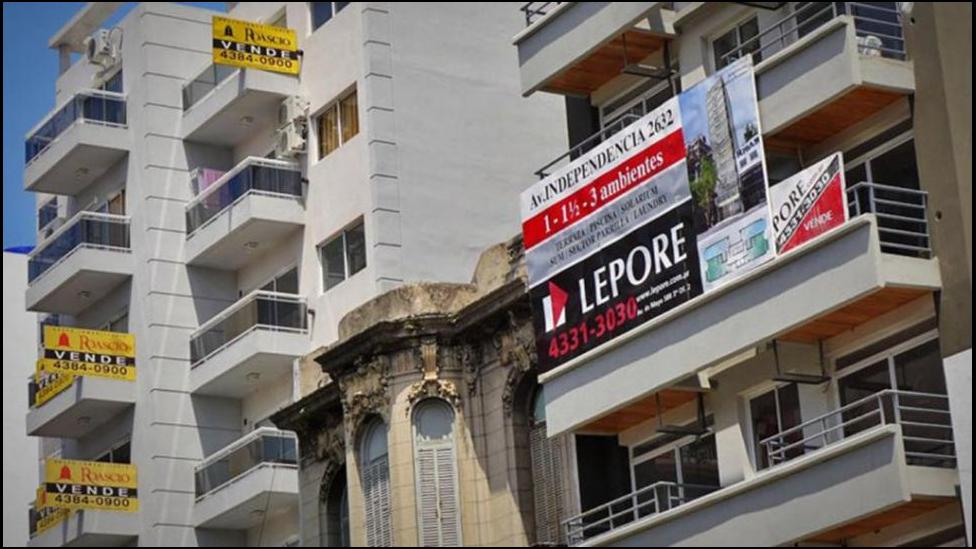

Which Buenos Aires Neighborhood Is the Right Fit?
On the one hand, if you’re looking for a quiet, residential neighborhood, something like Colegiales, Villa Ortúzar, Parque Saavedra, Belgrano (C and R), Coghlan and even Villa Crespo could be a good fit. However, gentrification is a thing: commerce and cultural activity is rapidly expanding across all neighborhoods in Buenos Aires, the so-called palermización (after the famous Palermo neighborhood, perhaps the busiest and most commercial of them all when it comes to arts and culture).
If you’re looking for a more active area, then Palermo, Almagro and Chacarita could be the right choice. These have also suffered from a big increase in activity, and have many options for outings, from bars to cultural centers and restaurants. It’s been a few years now since a kind of scammy strategy by real-estate companies started gaining traction in the Buenos Aires city areas in order to sell apartments at a higher cost. The (doubtful) expansion of the Palermo(s) across the city has been overwhelming for residents. Nowadays, every neighborhood is known as a type of “Palermo”, and it sort of makes sense; it is, and has been for many years, the most desirable place to live.
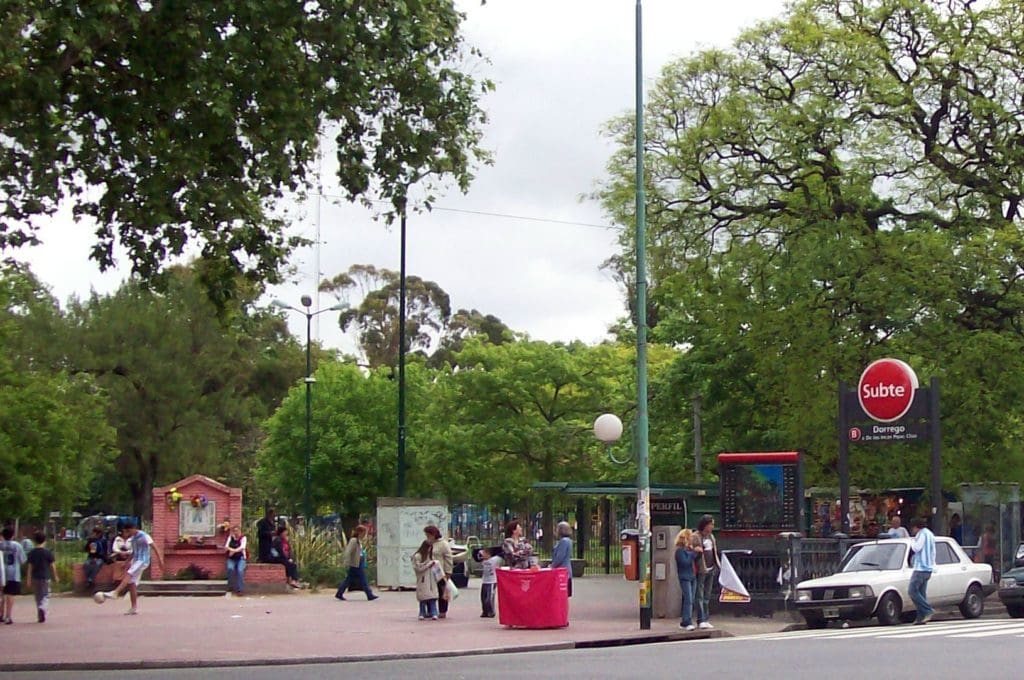

The city center and Barrio Norte (which is an umbrella term for some parts of Recoleta and the city center, near Avenida Santa Fe and Avenida Las Heras) tend to be more expensive, but, of course, there are exceptions to the rule. Barrio Norte can be a safe area if you stay away from these avenues, which can be noisier and more crowded. Some streets like Marcelo Torcuato de Alvear, Libertad and Arenales host some of the most expensive buildings and hotels in the city.
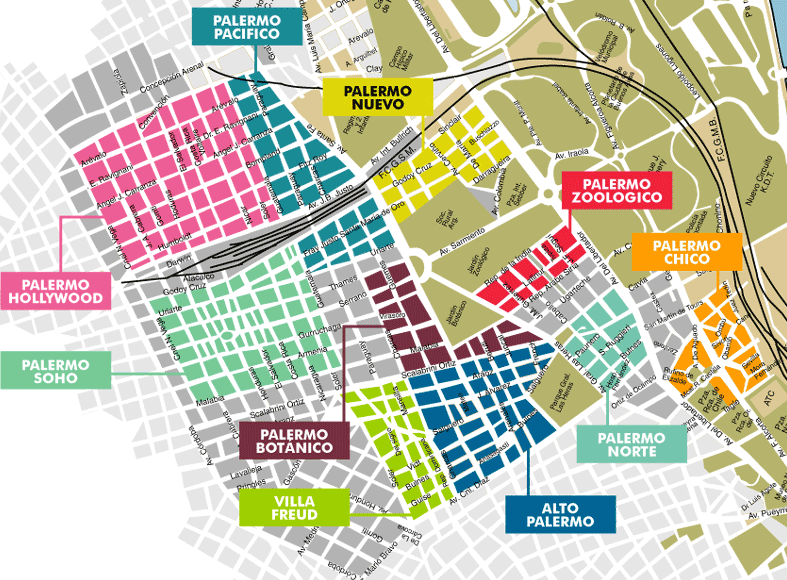

What Can I Do to Avoid Scams?
- Always ask for additional photos, especially when searching for apartments on sites like Mercadolibre or on Facebook groups. There’s always a chance the photos might be fake, and it is a definite red flag if the owner or broker does not want to provide them for you.
- You can access additional information like CUIL, CUIT, ID, ratings or data from the Colegio de Martilleros in Argentina by doing a quick Google search–unless the seller is the actual owner of the property, in which case you should pay even more attention to avoid scams.
- Never, never pay for everything up front before signing the contract. Be prepared to take a big luggage full of cash with you; it might seem strange, but that’s just the way it goes for Buenos Aires’ real estate (unsaid) rules.
- Make sure to read comments (again, for Mercadolibre and Marketplace) and the seller’s rating. If there is no information available, you should avoid contacting them. Also, beware if they only provide a means of contacting them through Facebook itself. However, Mercadolibre has a more trustworthy system in place, where you can automatically see the seller’s information–e-mail address, full name and phone number–if you’re interested.
- It is also advisable to mistrust very low prices, especially for sales. If the ad has spelling mistakes, is too informal, or has grammar issues, that is also a red flag.
- Do not provide personal information (bank account information, names of family members, etc.) under any circumstances.
If you have any doubts or want to report a scam, go to: Defensoría del Pueblo in Argentina
How Do Rental Law and Credits Work in Argentina?
“Ley de alquileres”
When November 2021 came around, new government notices and officials hinted at the Ley de alquileres’ (Law for Rentals) early demise, after just a couple of years of it being active. Some officials from different parties were talking about derogating the law, mainly because it didn’t have the effect on the Argentine economy on a micro scale than was initially thought.
The law involved a three-year contract with just one upgrade in rent a year, which, of course, is not proportional to national inflation rates at all. This resulted in unpredictability for tenants as to how much they’d be paying for rent, and for owners as to reliability. You should read local news sites to be up to speed, as changes in the law will inevitably affect your plans to live in Argentina and emigrate.
From Créditos UVA to New Legislastion for 2022
Getting a crédito UVA is no small feat. The credit is basically a mortgage provided by Banco Central (BCRA) in Argentina, which we’ve talked about in another article about exchange and finance. The credits are aimed towards buying, changing or rebuilding/recycling a permanent place of residence in Argentina.
The website explains this at length: “The UVA is the Purchasing Value Unit that can be updated by “CER”, a value that is updated daily and you can consult it on the page of the Central Bank of the Argentine Republic.” It is also aimed at “people in work activity (dependent or hired, self-employed and monotributistas), retirees and / or pensioners and former combatants of the Falkland Islands beneficiaries of the lifetime war pension.”
This means, in short, that Créditos UVA are only available for buying property, and not for renting. Nowadays, the chances of getting a Crédito UVA are slim, and that legislation is coming to an end. The Argentine Property Credit Chamber (known in Spanish as the Cámara Inmobiliaria Argentina) has determined to, on the one hand, prioritize adjustments according to annual inflation, and, on the other hand, determined that the payment of the mortgage cannot constitute more than 35% of the rentee’s tenant’s annual income. As of 2021-2, this change in government-sponsored credits is still under heated debate.
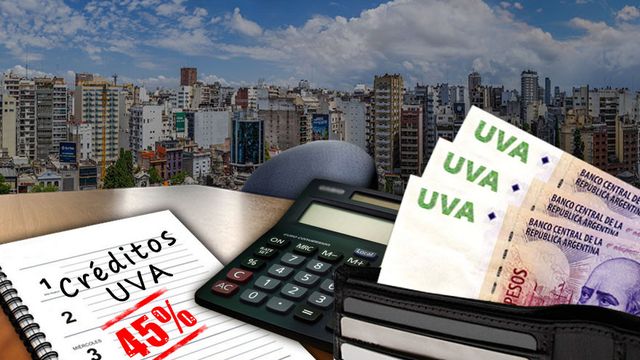

Looking for the Right Apartment
Buying or Leasing?
In Argentina, buying an apartment is a big decision that might compromise your family finances long-term. It might be a good decision, however, if you’re planning on settling down for good. In the country, because of its constant economic crises and the instability of the Argentine peso (Argentina’s local currency), the economy on a more macro scale is not reliable at all. On a given day, an apartment might cost a (supposedly) fixed amount of U$D; but it could be double that the week after. There’s really no telling.
The good thing about renting in Argentina is its flexibility. We’ve already talked about Argentina’s unreliable economy for investment and building patrimony in the country. It’s impossible to tell how much a property will be valued at five or ten years into the future. That’s why younger people who do not have the almost impossible amount of U$D available for investing in an apartment choose to rent. So, unless you already have tons of savings at your disposal, buying is not advisable. If, for instance, you’re looking to settle down with your family, then this could be a good option to take into consideration.
Best Websites for House and Apartment Rentals in Argentina
Not-so-obvious Options: Mercadolibre and Facebook Marketplace
Also read: A Complete Guide to Using Mercadolibre in Argentina and Ecommerce Sites
It’s not that easy to navigate Mercadolibre because of the huge offer that’s available, so this site is only good for looking up specific options. You can sort out rentals and transactions by neighborhood, price ranges and other filters, though those are the most useful ones. If and when you’re interested in an advertisement, you’ll be able to see if it’s a direct owner or if it’s being advertised by a real estate agency, so you’ll be able to know who you’re dealing with in advance. Mercadolibre will automatically provide your personal information: phone number for Whatsapp, full name and email.
Facebook marketplace is not the safest option, but it still works. You should watch out for “hidden” brokers, which don’t specify or clarify that they’re working for an agency (they advertise properties under their personal account, and not the agency’s.) Facebook has the least efficient sorting and filtering options out there. But there are Facebook groups for rentals in Argentina you should be aware of, like SOLO DUEÑOS C.A.B.A. It’s easy to get admitted into one of those groups, and the good thing about them is you can state you’re looking for an apartment or building with specific features and people will let you know, for the most part.
ZonaProp and Argenprop Rental Websites
Argenprop and ZonaProp are the easiest to navigate and definitely the most popular sites out there, which in turn means that there are more ads and postings on each of these websites for rentals. When visiting Argenprop, you should know there are some new features like a site that’s specific to business owners (emprendimientos) and for country clubs (suburbs in Argentina.) You can also choose between a postal code, map and real estate agency view.
As for ZonaProp, there are even more features like property appraisals (tasaciones), a guide to different Argentine neighborhoods and zones, and fire and housing insurance. You can check out which properties have lowered their prices every day.
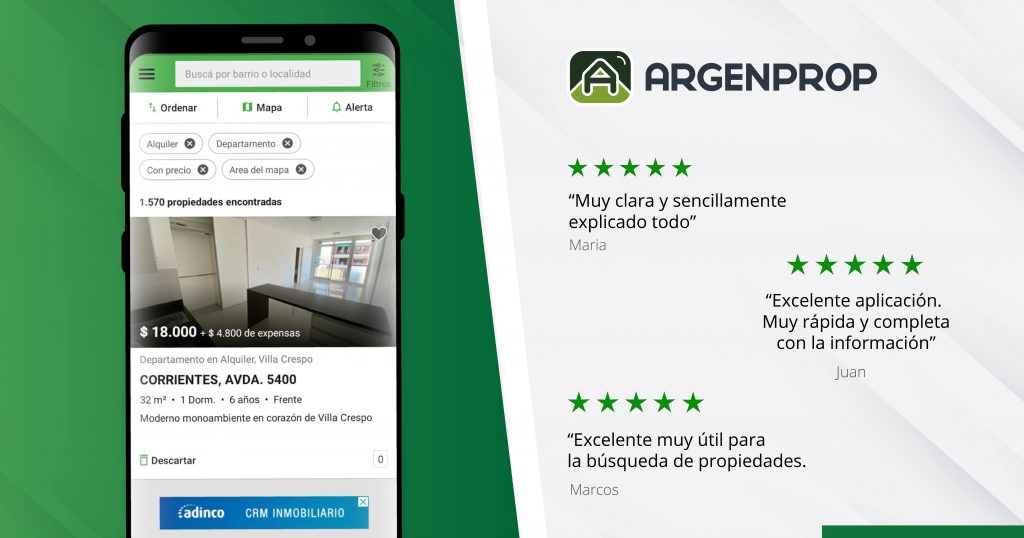

Solo Dueños Rental Website
Solo Dueños (Owners only, in translation) has an old-school interface that is not easy to navigate; but, as the name implies, it’s the only site for rentals in Argentina that focuses solely on renting directly to property owners. There are less options to choose from, but the search engine is pretty average when it comes to filtering out basic information.
Solo Dueños offers legal counseling, guarantees for property owners and potential tenants, as well as 360% tours (because of the pandemic, as we’ve explained above.) You can choose the type of property you’re looking for, the average rent price, as well as the currency that’s required for the transaction (keep in mind that in Argentina some apartment rentals are valued in U$D; however, this probably means that rent will be adjusted to inflation and exchange rates).



